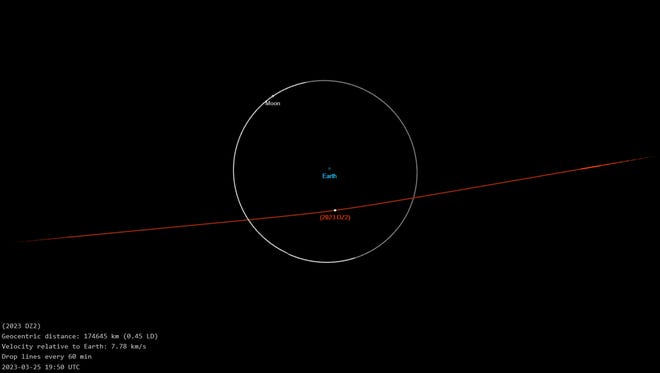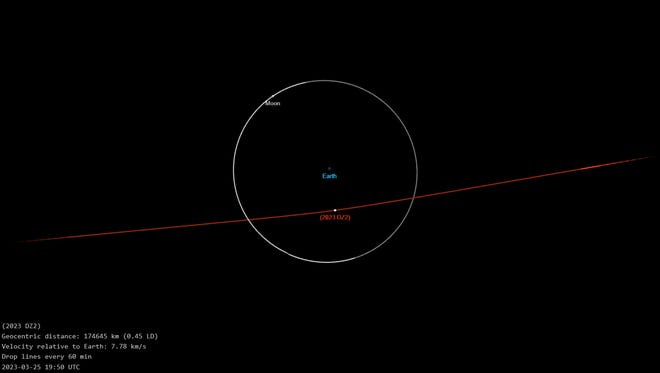[ad_1]
A newly discovered asteroid over 200 feet wide will zoom in between Earth and the moon this week in an occurrence NASA says only happens once per decade.
The asteroid, 2023 DZ2, was discovered in February by astronomers at the observatory of La Palma, in the Canary Islands, Spain, according to EarthSky. Since then, astronomers have continued to observe the asteroid to get a better idea of its size and orbit. NASA says the asteroid could be anywhere from 134 to 305 feet.
While this asteroid will safely pass by our planet this week, there is a slim chance we could have an eventual impact in a few years. Here’s what to know about the asteroid:
Valentine’s Day asteroid? NASA says asteroid as wide as a football field could hit Earth in 2046
Fireball: Asteroid hits Earth hours after being spotted, meteor turns into ‘beautiful’ fireball over Europe
How close will asteroid 2023 DZ2 be to Earth?
2023 DZ2 will miss Earth by 108,758 miles, according to NASA’s Center for Near Earth Object Studies. For reference, the moon is 238,855 miles away from Earth.
The asteroid is moving at a speed of 17,403 miles per hour.

When will asteroid 2023 DZ2 fly past Earth?
The asteroid will have it’s closest approach on Saturday, March 25 at approximately 3:51 p.m. ET.
What’s everyone talking about? Sign up for our trending newsletter to get the latest news of the day
Astronomers to observe 2023 DZ2
NASA said 2023 DZ2 will provide a “unique opportunity for science” since an asteroid of its size only has a close approach about once per decade.
The agency said astronomers with the International Asteroid Warning Network will observe the close approach in hopes to use it to learn more about planetary defense, which NASA practiced before with its DART spacecraft.
2023 DZ2 could hit Earth in 2026
This won’t be the only time 2023 DZ2 will have a close encounter with our planet. EarthSky said early data showed the asteroid has a 1-in-38 million chance to hit Earth on March 27, 2026.
NASA says an asteroid like 2023 DZ2, which is larger than 82 feet but smaller than 3,280 feet, would “likely cause local damage to the impact area.”
Asteroids’ close encounters with Earth
Asteroids are constantly having close approaches with Earth, and some of them actually do end up on our planet, although they typically turn into dazzling fireballs that don’t harm anybody.
Earlier this month, NASA said it was beginning to monitor 2023 DW, as the asteroid with a diameter around 160 feet has a “very small chance” of hitting our planet on Feb. 14, 2046, but it’s likely to pass Earth by more than 1.1 million miles.
Follow Jordan Mendoza on Twitter: @jordan_mendoza5.
[ad_2]
Source link





